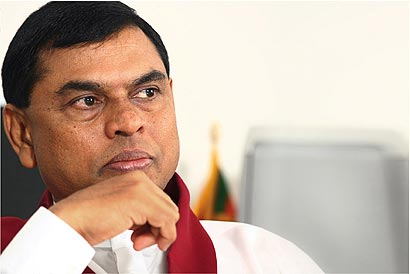18th Constitutional Amendment has twelve objectives

TC – by Basil Rajapaksa
(Following is an edited text of the speech made by Economic Development Minister Basil Rajapaksa, during the debate in Parliament on September 8, on the 18th Amendment to the Constitution)
The 18th Constitutional Amendment has 12 objectives, the first of which is the removal of fetters against the people’s sovereignty.
The legislative power of the people is exercised by the Parliament which is made up of elected representatives. In a referendum, the people exercise their supreme sovereignty by casting their vote. The executive power vested with the people including defence of the country is exercised through a President elected by the voters themselves.
The Judicial power of the people is exercised through the judiciary, tribunals or other institutes created and recognized by the Constitution or created by law. Therefore, it is our responsibility as people’s representatives to remove any such fetters against the people’s executive power or sovereignty. Removal of Sections 31 (2) and 92
(1) which pose restrictions on the sovereignty, helps consolidate sovereignty. The two-term ceiling on the executive Presidency is an affront to the people and their sovereignty.
Secondly, we are giving effect to the pledge made in the Mahinda Chintana – Vision for the future, that the President’s accountability to Parliament would be further strengthened. The President is generally accountable to Parliament and the 18th Amendment makes his attendance in Parliament compulsory.
The other objective is to solve the riddle of the 17th Amendment. It was deeply flawed. The DEW Gunasekera Committee appointed to go into it found most of its provisions not practicable. The Constitutional Council could not be appointed.
The UNP too had its fair share of difficulties in implementing the 17th Amendment. At least, the Elections Commission could not get off the ground.
The Constitutional Council has now been transformed into a Parliamentary Council conferring authority on Parliament. The present Amendment provides for the appointment of five members by the President as nominated by the Prime Minister and Leader of the Opposition.
Our fifth objective aims at putting an end to fetters against people’s sovereignty. Unlike its predecessor, the 18th Amendment under Section 41 (6) requires observations to be forwarded within a week failing which the President would act.
The sixth objective empowers all members of Parliament to make nominations which is a novel feature which democratises the process of nomination.
The seventh objective envisages a more efficient public service meant to accelerate national development and provide a better service to the public as provided for in the Mahinda Chintana – vision for the future.
There is an allegation that under Section 55 of the 18th Amendment we have dispersed with the freedom the public service enjoyed itself in regard to various matters.
Section 55 (1) in the Amendment however, stipulates, “the Cabinet of Ministers should provide for all policy matters relating to appointments, promotions, transfers, disciplinary control and dismissal of all public officers.”
The 18th Amendment has conferred on the Cabinet of Ministers all powers relating to appointment, promotion, transfer or disciplinary control of all Heads of Departments. The 17th Amendment stated, “The Cabinet of Ministers shall give effect to such powers only after calling for the observations of the Commission.”
In this new amendment we have not interfered with powers devolved upon the Provincial Councils. We have only maintained the status quo. Section 5 clearly states: In regard to the exercise of its powers the Commissions shall be accountable and answerable to Parliament and shall submit to Parliament a report of its performance during each calendar year. Consequently the Parliament has been further empowered.
The functions of the Commission have been explained in terms of Section 55 (3) of the 18th Amendment which states, “subject to the provisions of the Constitution, appointments, promotions, transfers and disciplinary control of public officers shall be berthed with the Public Service Commission.
Despite the Constitutional requirement in 57 (1), the Commission failed to appoint sub-committees. The Commission was adequately empowered to delegate its power to Heads of Departments or any other officers. This never did materialize. Having observed all these lapses and shortfalls we have incorporated into the new Amendment the special provision, “A specially stated by the Cabinet of Ministers…” so that the Commission has no alternative but to strictly comply with the Cabinet directives.
We have made the police, a true service to the people, having shed its military outlook. We made the police much closer to the people – a peoplized police.
The tenth objective deals with media freedom. This Commission had its control only over Rupavahini and SLBC. The ITN did not come under its purview. The Independent Election Commission has been given adequate powers to treat all media institutions equally since we firmly subscribe to the principle of equality before law.
We have made one more amendment! These Commissions including the Public Service Commission did not come under the financial control of Parliament.
Recruitments were made contrary to the accepted rules and regulations and procedures. The staff of all these Commissions is now deemed to be public officers – subject to Government regulations.
The President needs the strength and support of all to ‘deliver the goods’ during his second term as pledged. A stable Government is indispensable.

Latest Headlines in Sri Lanka
- Nomination process for Sri Lanka’s LG elections starts today March 17, 2025
- Shots fired at house in Midigama March 17, 2025
- Ranil Wickremesinghe rejects Batalanda Commission report March 16, 2025
- CID questions IGP Tennakoon’s family as manhunt continues March 16, 2025
- Sri Lanka to strengthen pension scheme for migrant workers & tourism sector March 16, 2025


